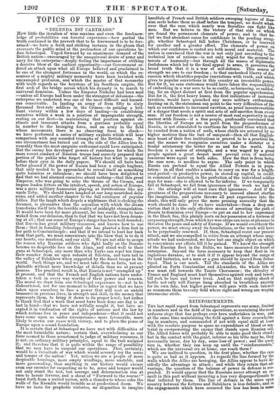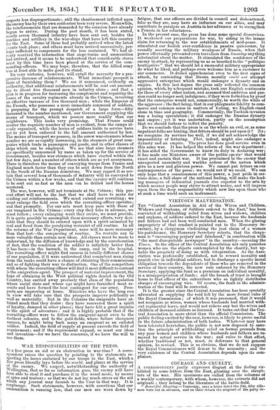REINFORCEMENTS.
TICE last rapid report from Sebastopol represents our army, limited in numbers and in the field of its operations, as sustaining the most arduous siege that has perhaps ever been undertaken in war, and at the same time maintaining the field against a force overwhelm- ing in numbers, and commanded if not with equal skill at least with the resolute purpose to spare no expenditure of blood or ma- terial in overpowering the enemy that stands upon Russian soil. The Allied forces will probably be able to make good their stand; but in the contest with the giant, inferior as his tribe may be, they necessarily incur, day by day, some loss-of power ; and the ques- tion is, whether they can keep up until the "reinforcements, which are the universal cry at home, can reach them ? We are inclined to question, in the first place, whether the case is quite so bad as it appears. As regards the line formed by the walls which the Allies are besieging, the Allies appear to have de- cidedly the advantage in attack ; and while they retain that ad- vantage, the question of the balance of power in defence is sus- pended. It would appear that the Russians never attempt an as- sault in this part without incurring a loss very disproportionate to that inflicted by them. The line of defence in the more open country between the fortress and Balaklava is less definite, and in the engagements which have occurred the loss has been in some the enemy has by their own confession been very severe. Meanwhile, the reinforcements that are demanded by the occasion have already begun to arrive. During the past month, it has been stated, nearly seven thousand infantry have been sent out, besides the marines and artillery in the war-ships that have left this country for the East. Some of these had probably arrived when the latest events took place ; and others must have arrived successively, per- haps sufficient to compensate for the loss sustained. We had al- ready received the information that siege-trains and ammunition bad arrived, and it seems to be understood that considerable stores must by this time have been placed at the service of the com- manding-officers. We may hope, therefore, that the Allied army was at least able to make good its stand.
Its very victories, however, will entail the necessity for a pro- gressive increase of reinforcements. What immediate prospect is there of furnishing them ? We see it announced, evidently on authority, that additional reinforcements will be sent out amount- ing to about five thousand men in infantry alone ; and that a plan is in progress for increasing the complement and repairing the losses of the cavalry regiments already in the Crimea, involving an effective increase of five thousand men ; while the Emperor of the French, who possesses a more immediate command of soldiers, is preparing for the prompt despatch of a large force—fifty thousand is the number mentioned, our Government supplying the means of transport, which we possess more readily than our neighbours. • This looks very promising. That France could muster the requisite number of men is evident, from the camps al- ready organized, while the levies of soldiers liable to service have not as yet been enforced to the full amount authorized by law. The means of transport we possess, in the screw war-steamers whose number we are so rapidly increasing, in the steamers of great com- panies which trade in passengers and goods, and in other classes of ships which can be employed. We see that nine large steamers are specifically announced by name as taken up for the service of Government, besides war-steamers which have started within the last few days, and a number of others which are as yet anonymous. There is therefore the means of conveying troops from France and England much faster than they can be sent down from the North to the South of the Russian dominions. We may regard it as cer- tain that several tens of thousands of infantry will be conveyed to the Crimea within a few weeks, and that the cavalry will continue to be sent out as fast as the men can be drilled and the horses mustered.
The war, however, will not terminate at the Crimea; this pre- sent effort will not be the last that we shall have to make for sending out reinforcements. We must extend our recruiting; we must enlarge the field over which the recruiting-officer operates ; and that promptly. For our acts must keep pace with those of our vanguard in the Crimea : every step they take in advance, we must follow ; every enlarging want they create, we must provide. It is quite possible to accomplish these necessary efforts, very desi- rable that they should be entered upon with a spirit animated by zeal and freed from the paralyzing restraint of old routine. In all the reforms of the War Department, none will be more necessary than that last—the conquering of routine. No recruits can be more valuable than certain new ideas. All classes must be made to understand, by the diffusion of knowledge and by the corroboration of fact, that the condition of the soldier is infinitely better than it has been—in the barrack, in the camp, and in the hospital. The recruiting-officer might find success in totally different classes of our population, if it were understood that competent men rising from the ranks could have a chance of obtaining their commissions and so of fighting their way to distinction. One of the competitors with whom the recruiting-officer will find it most difficult to contend is the emigration-agent. The prospect of material improvement, the hope of obtaining in the West political rights denied in the Old Country, has carried away precisely that class of the population whose social state and whose age might have furnished most re- cruits and have formed the best contingent for our army. Pros- pects are improving at home. Ministers who have the long run in view will take care that the prospects improve politically as well as materially. But in the Colonies the emigrants have at- tained much that they desire : they have recovered there a spirit of loyalty, damped in other places ; they have felt a great impulse to the spirit of adventure : and it is highly probable that if the recruiting-officer were to follow the emigrant-agent even to the furthest colonies, and to the gold-fields, where failure checquers success, he might bring back many an emigrant as an enlisted soldier. Indeed, the field of supply at present exceeds the field of requirement ; and if the requirement expand, so must our ideas and invention—for we have the resources, if we have the will to use them.



































 Previous page
Previous page